ISLAMABAD: Shehbaz Sharif is set to begin a second term as Pakistan’s prime minister in coming days, returning to the role he had until August when parliament was dissolved ahead of last week’s elections.
Sharif, 72, was named by his party and coalition allies to head the nuclear-armed nation despite his elder brother and three-time Prime Minister Nawaz Sharif winning a seat in the assembly and being favorite to be sworn in for a fourth term.
Nawaz Sharif’s daughter Maryam said in a post on X that her father did not want to run a minority coalition government having had clear majorities in his three previous stints as premier. Their Pakistan Muslim League-Nawaz (PML-N) party controls only 80 seats in the 264-seat parliament but has been promised support by six other parties for a majority.
The younger Sharif played a key role in keeping together a coalition of disparate parties for 16 months after parliament voted former premier and rival Imran Khan out of office in 2022, and in securing a last gasp International Monetary Fund (IMF) deal in 2023.
Shehbaz Sharif became prime minister as the PML-N buried differences with the powerful military in the face of their common rival, Khan, who was at odds with top generals over policy differences.
At the time, Nawaz Sharif was in self-imposed exile in London and disqualified from holding public office.
Before his stint as prime minister, the younger Sharif was known more as a good administrator than a politician, having served as chief minister thrice in the country’s largest province, Punjab.
But as prime minister, he quickly took on the role of peacemaker between coalition parties often at odds with one another over key policies.
Shehbaz Sharif’s biggest achievement in his short tenure was clinching a bailout from the IMF with Pakistan on the brink of a debt default. The deal was signed after Sharif personally called on IMF chief Kristalina Georgieva last June.
However, under his government, inflation touched a high of 38 percent with record depreciation of the rupee currency — mainly due to structural reforms necessitated by the IMF program to stabilize the economy.
He blames the economic meltdown on Khan’s government, which he says broke an agreement with IMF just before he was ousted. Sharif said his government had to introduce a slew of reforms and scrap subsidies, causing inflation to surge.
KEY CHALLENGES
Pakistan continues to be enmeshed in the economic crisis with inflation remaining high, hovering around 30 percent, and economic growth slowing to around 2 percent.
Sharif will need to emulate his feat of securing a short-term IMF bailout with the current program expiring next month and a new extended deal needed to keep Pakistan on a narrow path to recovery.
But his main role will be to maintain ties with the military, which has directly or indirectly dominated Pakistan since independence. Unlike his elder brother, who has had a rocky relationship with the military in all his three terms, the younger Sharif is considered more acceptable and compliant by the generals, analysts say.
For several years, the military has denied it interferes in politics. But it has in the past directly intervened to topple civilian governments three times, and no prime minister has finished a full five-year term since independence in 1947.
Privatising some lumbering state giants, including the national airline, and securing foreign investment will also be key to ease the economic crisis. The Sharifs have close ties with rulers in Saudi Arabia and Qatar, which could help in securing investments in several projects Pakistan has lately showcased for sale.
Although defense and key foreign policy decisions are largely influenced by the military, Sharif will have to juggle relations with the US and China, both major allies. He is also faced with dealing with fraying ties with three of Pakistan’s four neighbors, India, Iran and Afghanistan.
‘WORKAHOLIC’
Sharif was born in the eastern city of Lahore in a wealthy Kashmiri-origin family that was in the steel business. He started his political career as the chief minister of Punjab in 1997 with a signature “can-do” administrative style.
His cabinet members and bureaucrats who have worked closely with him call him a workaholic.
As chief minister, the younger Sharif planned and executed a number of ambitious infrastructure mega-projects, including Pakistan’s first modern mass transport system in Lahore.
He was caught up in the national political upheaval when his brother was ousted from the premiership by a military coup in 1999 and he went into exile in Saudi Arabia.
Sharif entered the national political scene when he became the chief of the PML-N after the elder Sharif was found guilty in 2017 on charges of concealing assets related to the Panama Papers revelations.
Married twice, Shehbaz Sharif has two sons and two daughters from his first marriage but none from the second. One of the sons is in politics but the others are not in public life.
His second wife is Tehmina Durrani, the well-known author of “My Feudal Lord,” an autobiography about an abusive married life with an earlier husband.
Shehbaz Sharif set for Pakistan’s top job as elder brother steps aside
https://arab.news/6sb9e
Shehbaz Sharif set for Pakistan’s top job as elder brother steps aside
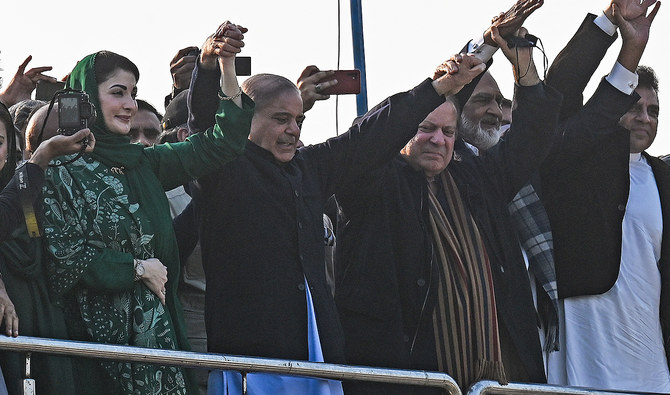
- Nawaz Sharif’s daughter Maryam said in a post on X that her father did not want to run a minority coalition government
- Younger Sharif played key role in keeping together coalition of disparate parties for 16 months between April 2022 to August 2023
Over 50,000 Pakistani Hajj pilgrims to benefit from Makkah Route Initiative this year — ministry

- This year Saudi Arabia extended Makkah Route Initiative to Karachi airport, was previously available only in Islamabad
- Around 179,210 Pakistanis will perform Hajj pilgrimage this year under both the government and private schemes
ISLAMABAD: The religious affairs ministry said on Friday 26,000 Pakistani Hajj pilgrims had benefited from the Makkah Route Initiative last year, with the government planning to double the figure this year with the inauguration of the project in Karachi.
Pakistani officials last month confirmed Saudi Arabia’s decision to expand the Makkah Route Initiative, previously available only in Islamabad, to the airport in Karachi, the country’s largest and most populous city.
Launched in 2019, the Makkah Route Initiative allows for the completion of immigration procedures at the pilgrims’ country of departure, making it possible to bypass long immigration and customs checks on reaching Saudi Arabia. The facility significantly reduces waiting times and makes the entry process smoother and faster.
“Last year, the count of pilgrims utilizing the ‘Route to Makkah’ stood at 26,000 while this year, concerted efforts have been made to double the number of Pakistani Hajj pilgrims benefiting from this streamlined process,” state-run APP news agency said, quoting Secretary Religious Affairs Zulfiqar Haider, who alongside Nawaf bin Said Al-Malki, Saudi Arabia’s ambassador to Pakistan, formally inaugurated this year’s ‘Route to Makkah’ project at the Islamabad International Airport on Friday.
“Saudi immigration and customs procedures for Hajj pilgrims departing from Islamabad would now be efficiently conducted in Islamabad itself,” Haider said.
“Consequently, these pilgrims would swiftly navigate through the Saudi airport and proceed to their destinations without delay.”
This year, around 179,210 Pakistanis will perform Hajj under both the government and private schemes, for which a month-long flight operation started on May 9.
Out of 179,210 pilgrims, 89,605 each will embark on the holy journey under the government and private schemes, while a quota of 25,000 and 44,802 pilgrims, respectively, has been allocated to the sponsorship schemes.
Under the Hajj flight operation, five airlines – Pakistan International Airlines, Saudi Airlines, Airblue, Serene Air, and Air Sial – will operate 259 sorties to transport around 68,000 intending pilgrims from eight major cities of Pakistan, namely Islamabad, Karachi, Lahore, Peshawar, Multan, Quetta, Sialkot, and Sukkur, to Jeddah and Madinah under the government scheme.
The first set of Hajj flights took off on Thursday early morning.
PM orders immediate rebuilding of girls school bombed by militants in northwestern Pakistan
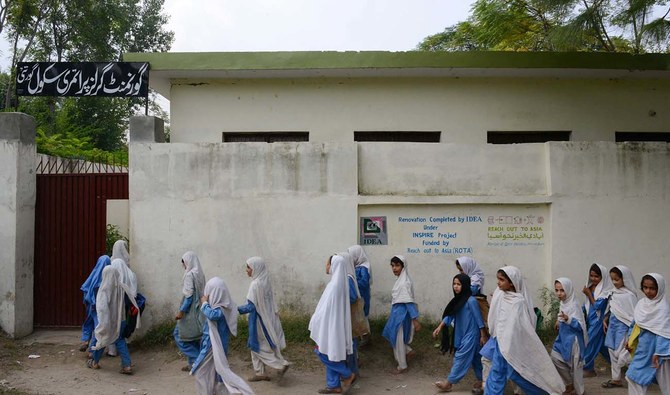
- Attackers beat up school guard before setting off explosives at private Aafia Islamic Girls Model School in North Waziristan
- Pakistan witnessed multiple attacks on girls schools until 2019, especially in Swat Valley and elsewhere in northwest
ISLAMABAD: Pakistani Prime Minister Shehbaz Sharif on Friday ordered that a girls school bombed by militants this week in a former stronghold of the Pakistani Taliban should be immediately rebuild, vowing to provide women with equal opportunities for education.
There was no immediate claim of responsibility for the attack late Wednesday that targeted the only girls school in Shawa, a town in the North Waziristan district in the Khyber Pakhtunkhwa province bordering Afghanistan.
Suspicion is likely to fall on the Pakistani Taliban, or Tehreek-e-Taliban Pakistan (TTP), who have targeted girls schools in the province in the past, saying that women should not be educated.
The TTP group was evicted from northwest Pakistan’s Swat and other regions in recent years after successive military operations. The TTP are a separate group but a close ally of the Afghan Taliban, who seized power in Afghanistan in 2021. The Taliban takeover in neighboring Afghanistan has emboldened the Pakistani Taliban, the Pakistan government says.
“Prime Minister directed to immediately identify the people involved in the incident and ensure that they are punished,” a statement from Sharif’s office said, adding that the PM had instructed that the part of the school destroyed in the attack be “immediately” rebuilt at government expense.
“The nefarious ambitions of terrorists to stop the education of girls will never be allowed to succeed,” the statement quoted Sharif as saying. “Terrorist elements who are trying to create obstacles in the education of the daughters of the nation will be brought to justice.”
Pakistan witnessed multiple attacks on girls schools until 2019, especially in the Swat Valley and elsewhere in the northwest where the Pakistani Taliban long controlled the former tribal regions. In 2012, the insurgents attacked Malala Yousafzai, a teenage student and advocate for the education of girls who went on to win the Nobel Peace Prize.
In the latest incident, police said the attackers first beat up the school guard before setting off the explosives at the private Aafia Islamic Girls Model School, which has 150 students.
In a statement, Abdullah Fadil, the UNICEF representative in Pakistan, said the “destruction of a girls’ school in a remote and underserved area is a heinous crime detrimental to national progress.” He cited Sharif’s statement on Wednesday declaring an education emergency and pledging to work toward enrolling 26 million out-of-school children.
With inputs from AP
Pakistani police prevent pro-Palestinian protesters from moving toward US embassy in Islamabad
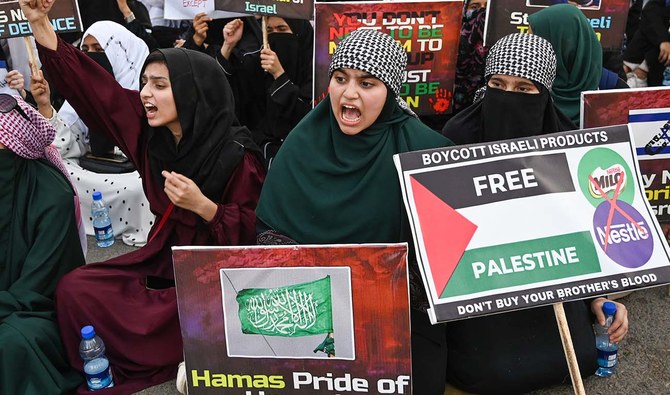
- Police used batons on demonstrators who briefly blocked a key road and later staged a sit-in near a high-security area
- Students from the Jamaat-e-Islami Pakistan party posted videos on social media, claiming they were beaten by police
ISLAMABAD: Police in Pakistan’s capital Islamabad on Friday prevented a pro-Palestinian rally by a religious party from moving toward the US Embassy, where demonstrators wanted to stage a sit-in protesting Israel’s strikes in Gaza.
Police used batons on the demonstrators, angering hundreds of rallygoers who briefly blocked a key road and later staged a sit-in near a high-security area where foreign embassies and the offices of president, prime minister and parliament are located.
Students from the Jamaat-e-Islami Pakistan party posted videos on social media, claiming they were beaten by police who did not allow them to go toward the American embassy for a peaceful rally to denounce the Israeli strikes on Gaza.
Demonstrators held banners and posters with slogans opposing Israel and the United States and in support of the Palestinians. Organizers vowed to continue raising their voices for the Palestinians.
According to police, officers were negotiating with demonstrators to end the sit-in.
Downside risks for Pakistan remain exceptionally high — IMF
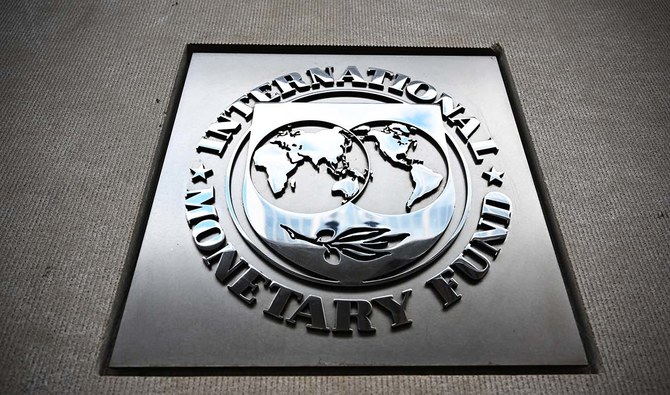
- Lender says while government has indicated intention to continue reforms, political uncertainty remains significant
- Policy slippages and lower external financing could undermine path to debt sustainability, put pressure on exchange rate
KARACHI: Downside risks for the Pakistani economy remain exceptionally high, the International Monetary Fund (IMF) said on Friday in its staff report on the country, ahead of talks with the fund on a longer term program.
An International Monetary Fund mission is expected to visit Pakistan this month to discuss a new program, ahead of Islamabad beginning its annual budget-making process for the next financial year.
“Downside risks remain exceptionally high. While the new government has indicated its intention to continue the SBA’s policies, political uncertainty remains significant,” said the fund in its staff report following the second and final review under the standby arrangement (SBA).
The fund added that political complexities and high cost of living could weigh on policy, adding that policy slippages, together with lower external financing, could undermine the narrow path to debt sustainability and place pressure on the exchange rate.
The IMF also said higher commodity prices and disruptions to shipping, or tighter global financial conditions, would also adversely affect external stability for the cash-strapped nation.
The fund stressed the need for timely post-program external financing disbursements.
Pakistan last month completed a short-term $3 billion program, which helped stave off sovereign default, but the government of Prime Minister Shehbaz Sharif has stressed the need for a fresh, longer term program.
Pakistan narrowly averted default last summer, and its $350 billion economy has stabilized after the completion of the last IMF program, with inflation coming down to around 17 percent in April from a record high 38 percent last May.
It is still dealing with a high fiscal shortfall and while it has controlled its external account deficit through import control mechanisms, it has come at the expense of stagnating growth, which is expected to be around 2 percent this year compared to negative growth last year.
Pakistan is expected to seek at least $6 billion and request additional financing from the Fund under the Resilience and Sustainability Trust.
Gang mastermind, extradited from Pakistan, jailed for life for UK police officer killing
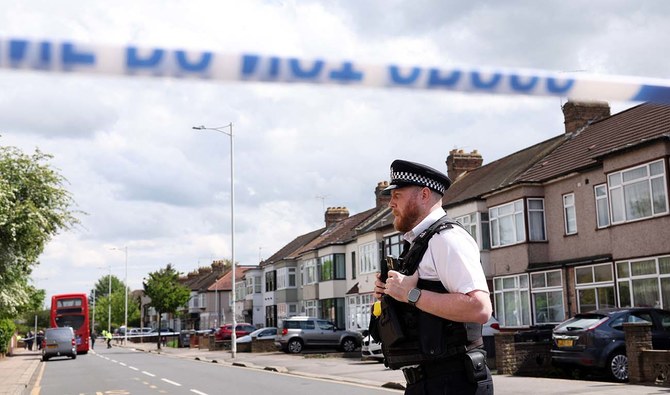
- Piran Ditta Khan fled UK after Sharon Beshenivsky was shot at close range in Bradford in 2005
- Khan, a former takeaway boss, was said to be the ringleader of the gang involved in the murder
LONDON: A 75-year-old man who was extradited from Pakistan was jailed for life on Friday for the murder of a British police officer nearly 20 years ago.
Piran Ditta Khan fled the country after Sharon Beshenivsky was shot at close range as she and a colleague arrived at the scene of a robbery at a travel agency in Bradford, northern England, in 2005.
Although he did not pull the trigger, prosecutors at his trial said he was equally guilty of murder as he had planned the raid and knew that loaded weapons would be used.
Judge Nicholas Hilliard at Leeds Crown Court on Friday handed Khan a life sentence with a minimum term of 40 years and told him: “You will inevitably spend the remainder of your life in custody.”
Beshenivsky, 38, had only been an officer with West Yorkshire Police for nine months before her death, which happened on her daughter Lydia’s fourth birthday.
“Every birthday is a reminder of what happened that day,” Lydia said in an impact statement read in court.
“It has recently been Mother’s Day, and while my friends are celebrating with their mums, I sadly can never do that.”
She was “too young and innocent” to understand why her mother did not return from work to celebrate her birthday, the statement added.
Judge Hilliard praised Beshenivsky’s bravery in responding to the call “when she and her colleague had no way of knowing what they would be confronted with when they got there.
“Sharon Beshenivsky’s courage and commitment to duty that day cost her her life,” he added.
The rare fatal shooting of a police officer on duty caused widespread shock and revived calls for British police to routinely carry guns.
Khan, a former takeaway boss, was said by prosecutors to be the ringleader of the gang involved in the killing on November 18, 2005.
He remained in a lookout car during the robbery, played a “pivotal” role in planning the heist and knew that loaded firearms would be used.
As such he was as culpable of Beshenivsky’s murder “as surely as if he had pulled the trigger on that pistol himself,” prosecutors told his trial.
He claimed he was trying to recoup money owed to him by the owner of the travel agency but lawyers said there was no evidence for this.
The gang escaped with little more than £5,000.
Khan was arrested in Islamabad in January 2020 after years on the run and extradited in April 2023.
He was found guilty of murder as well as firearms offenses. He had admitted robbery.
Six other gang members have previously been jailed over the shooting, which also saw Beshenivsky’s colleague Teresa Milburn shot in the chest.
Milburn, who was 37 at the time, had joined the force two years beforehand.
Three of the men, including one who fled to Somalia but was later extradited, were jailed for life and told they would serve at least 35 years behind bars.
West Yorkshire Police Assistant Chief Constable Patrick Twiggs said members of the force “welcome the life sentence handed down to Khan.
“West Yorkshire Police will continue to honor Sharon’s memory, we still mourn the loss, we still miss her, she will be forever in our thoughts,” he added.










